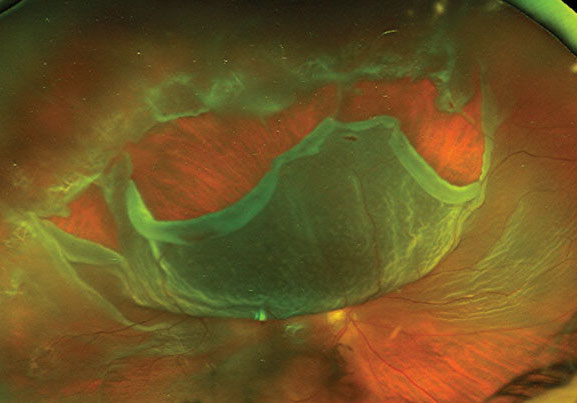 |
| Atopic dermatitis patients have a higher chance of developing retinal detachment at an earlier age and post-cataract surgery. Photo: Mohammad Rafieetary, OD. Click image to enlarge. |
An association between retinal detachment (RD) and atopic dermatitis (AD) may not be top of mind during routine eye exams but the connection warrants attention, researchers say. A team of researchers in Korea recently determined that atopic patients develop RD at a younger age with a poorer prognosis due to a high incidence of proliferative vitreoretinopathy (PVR) or recurrence. AD patients also had a much higher risk of RD after cataract surgery.
The retrospective review analyzed 2,257 patients who underwent RD surgery between 2008 and 2018. The researchers found 61 patients who were diagnosed as AD and assigned them into the experimental group. They randomly selected and assigned 100 patients who did not have AD into the control group.
The study found post-op VA and prognosis were significantly worse, and bilateral involvement of RD was more common in the AD group than the control group. Characteristics of retinal breaks were different between the two groups. Despite similar macular-off rates and preoperative VAs between the two groups, vitrectomy and encircling together as an initial operative method was performed more in the AD group than the control group (38% vs. 3%). The surgical method of vitrectomy and encircling together is usually performed for patients with severe PVR or retinal reattachment due to retinal dialysis.
The study also found that the risk of developing RD within one year after cataract surgery was significantly higher in pseudophakic patients of the AD group than the control group. In phakic eyes, the movement of the vitreous body might be limited due to the lens. Thus, the progression of RD could be suppressed to a certain extent.
“However, after a cataract surgery, these mechanisms might be broken and be more susceptible to RD development due to trauma of eyelid rubbing,” the researchers suggested. “In addition, atopic patients could be more vulnerable to RD due to their specific immune reactions and the resulting degeneration of the vitreous body.”
They concluded that AD patients need extensive treatment and management. “Careful examination should be performed regularly for atopic patients after a cataract surgery to achieve the best patient outcomes,” they noted.
Lee Y, Park WK, Kim RY, et al. Characteristics of retinal detachment associated with atopic dermatitis. BMC Ophthalmol. October 11, 2021. [Epub ahead of print]. |

